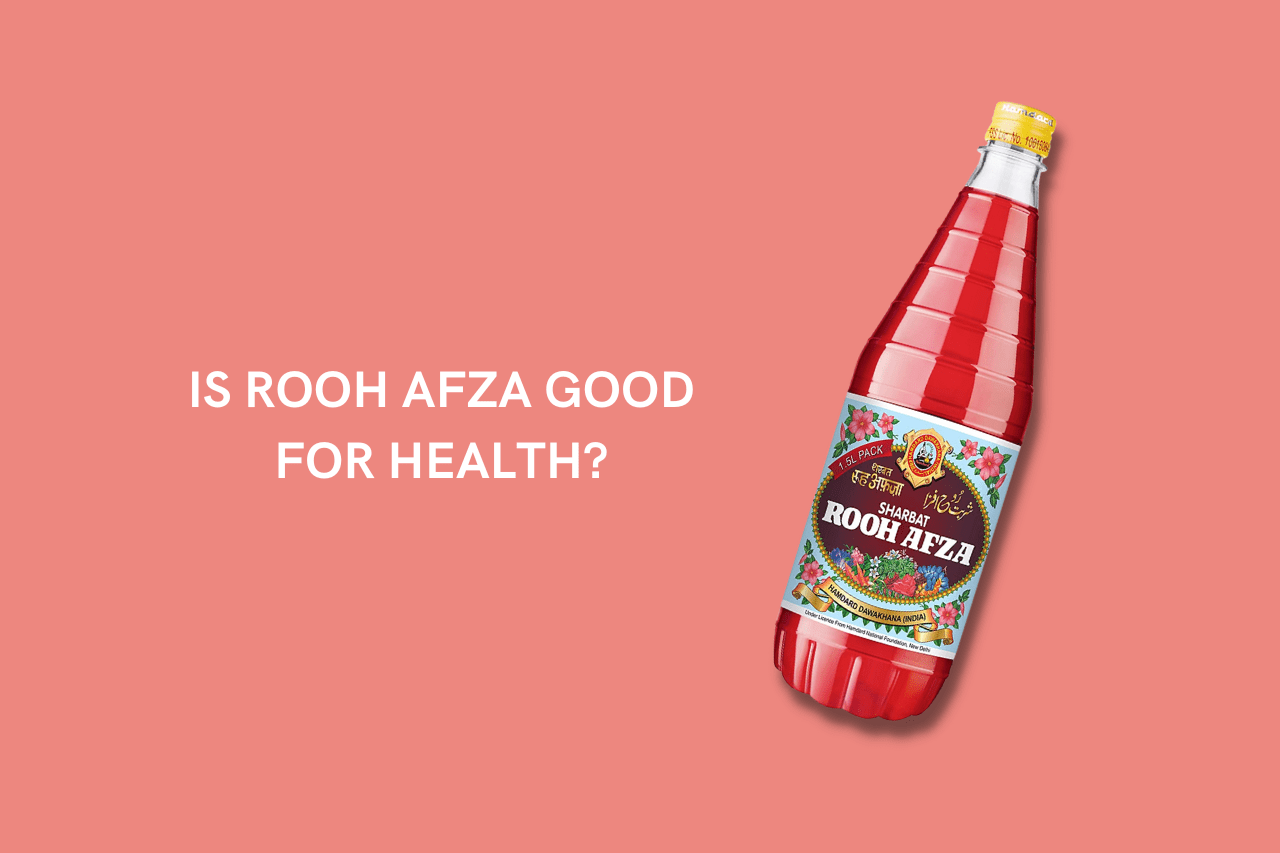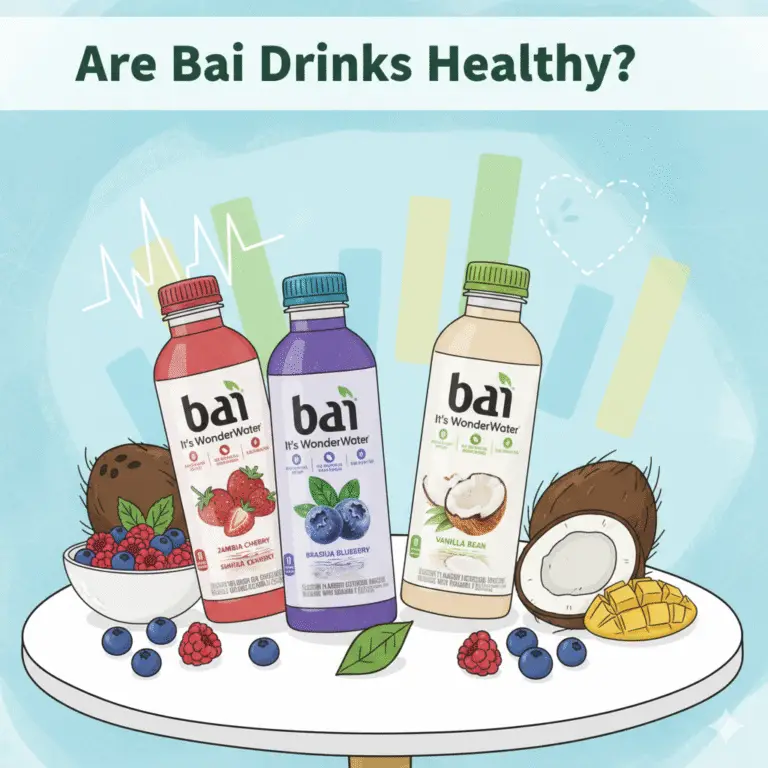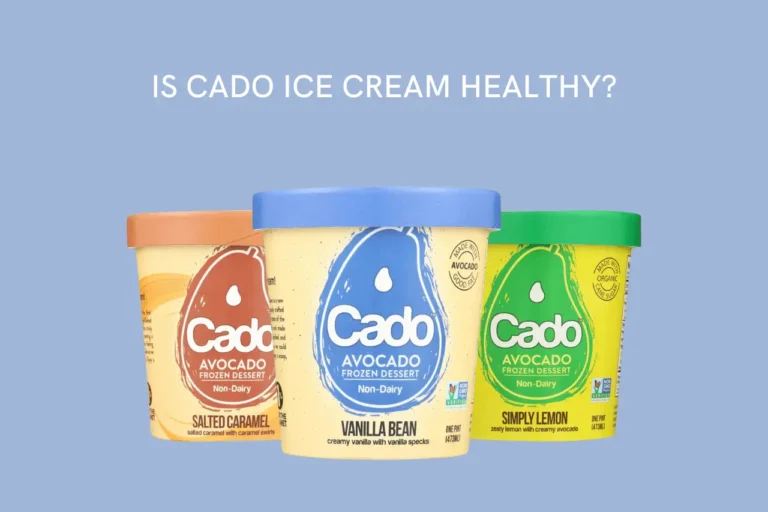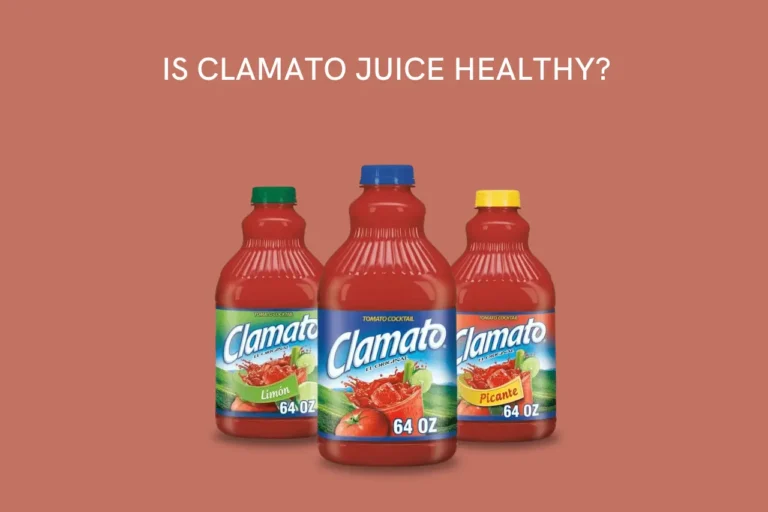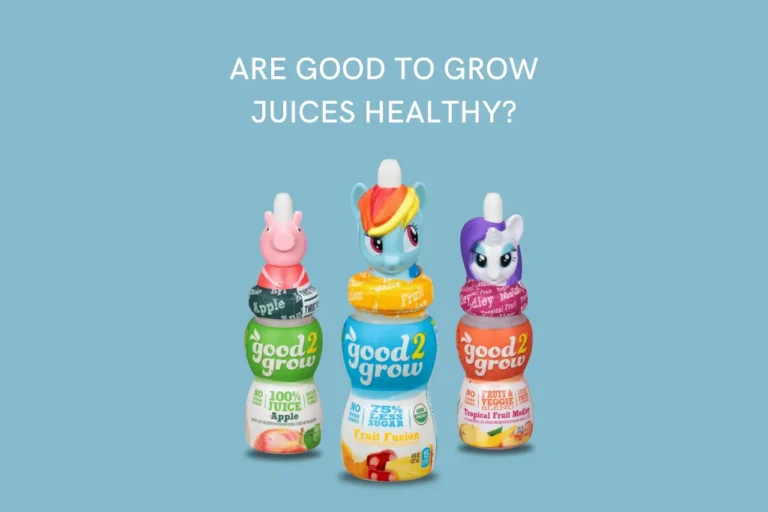Do you remember sipping on that sweet, red syrup as a child? The one that would cool you down on a hot summer day and bring a smile to your face? Yes, I’m talking about Rooh Afza.
Rooh Afza is a popular rose-flavored syrup(sherbet) that has been a people’s favorite drink in South Asian countries for over 110 years.
It is made from a blend of sugar, herbs, flowers, vegetables and fruits, and is known for its unique taste.
And while it is loved by many for its sweet and refreshing taste, Is Rooh Afza good for health?
Short answer: Rooh Afza is not good for health because it is high in sugar, low in nutrition, and contains unhealthy ingredients such as sodium benzoate and artificial colors.
Let’s dive into more about Rooh Afza, including its nutritional value, ingredients, and some commonly asked questions.
Also read: Is Tang Good For Health? The Truth Behind This Popular Drink
Nutritional value of Rooh Afza
Rooh Afza is a primary source of sugar and carbohydrates. It also contains vitamins and minerals but in a insignificant amount.
Here is the nutritional value of a 100ml serving of Rooh Afza:
| Nutrients | Amount per 100ml |
|---|---|
| Calories | 414 |
| Carbohydrates | 103.5g |
| Sugar | 103.5g |
| Fats | 0g |
| Protein | 0.5g |
What are the ingredients in Rooh Afza?
Rooh Afza is composed of both natural and artificial ingredients, such as:
Sugar: It is the main ingredient in Rooh Afza, used to sweeten the drink and provide instant energy.
Rose or gulab: It’s another main ingredient after sugar that gives the drink it’s distinctive rose flavor.
Herbs: Rooh Afza combines a number of different herbs, including coriander, lotus, blue star water, spearmint, kewra, European white lily, and sandalwood.
These herbs are added to the drink to enhance its flavor and aroma.
Fruit juices: To add flavor and sweetness, a variety of fruit juices, such as pineapple juice, orange juice, and lemon juice, are used.
Vegetables: Various vegetables are used, including carrots, mint, and spinach.
Food color: Rooh Afza uses various food colors to provide a distinct appearance. You will learn about these colors below.
Preservatives: Rooh Afza contains preservatives like sodium benzoate to improve shelf life.
Acidity regulator: This is used to maintain the pH level of the drink. Rooh Afza uses citric acid as an acidity regulator.
Flavors: Rooh Afza uses both natural and artificial flavors to enhance the flavor. However, it is unknown what these flavors are.
In general, 88% of the drink is made up of sugar, while the remaining 12% comprises other ingredients such as herbs, vegetable, fruits, preservatives, colors and flavors.
4 Reasons Rooh Afza is not good for health
1. Extremely high in sugar
Rooh Afza contains a large amount of sugar which is the main reason behind it’s sweetness. Just 2 tablespoons (30ml) of Rooh Afza contains about 31g of sugar.
This is the same amount of sugar found in an entire can of Coca-Cola or Pepsi.
According to the American Heart Association, the daily recommended sugar intake is 36g for men and 24g for women. Consuming just 2 tablespoons of Rooh Afza exceeds 85% of the limit for men and 100% for women.
The high sugar content in Rooh Afza can have various negative health issues, particularly for those who consume it regularly, such as:
- Weight gain
- Insulin resistance
- High blood pressure
- Increased risk of type 2 diabetes
- Heart disease
Although Rooh Afza also comes in a sugar-free variant, it contains maltitol and oligosaccharides, which can have side effects on some people. I will discuss this further in another section of this post.
2. Use of sodium benzoate
Rooh Afza contains sodium benzoate, a synthetic Class II preservative that helps extend its shelf life and prevent the growth of bacteria, yeast, and mold growth.
However, this preservative is associated with various health issues.
There are studies that show that sodium benzoate can cause DNA damage, generate oxidative stress, and have an adverse effect on the liver and kidneys[1].
In addition, it is also found to be associated with hyperactivity in children[2].
Furthermore, when sodium benzoate is mixed with vitamin C, it is transformed into benzene(a carcinogenic substance). This substance is highly toxic, mutagenic, and teratogenic[3].
Therefore, you should never consume Rooh Afza with drinks containing vitamin C, such as lemon.
Note that the negative effects of sodium benzoate are usually possible when you consume high doses of it.
However, because this preservative is present in most foods, you may consume more of it undesirably, which can have negative health effects.
3. Use of synthetic food colors
Rooh Afza contains various synthetic colors, such as cochineal red(E124), carmoisine(E122), and tartrazine(E102).
These colors are added to improve the drink’s appearance, but they have been linked to various health concerns.
For example, Cochineal red gives a bright red color to drink but has been linked to hyperactivity in children and problems with asthmatics[4]. It is also banned in many countries as a carcinogen.
In addition, synthetic colors like Carmoisine and Tartrazine have been associated with hyperactivity in children, anxiety, abdominal pain, and certain allergies[5][6].
While the amounts of these synthetic colors in Rooh Afza are generally considered safe, it is still important to limit their consumption.
4. Low in nutrition
Despite containing various herbs, fruits, and vegetables, Rooh Afza is low in nutrition.
It does contain some vitamins and minerals but in a very insignificant amount that they are not even mentioned on the nutritional label.
While some may argue that sharbat isn’t supposed to be nutritious—and some might even agree—but it also doesn’t have to be unhealthy.
You can opt for other drinks that provide health benefits beyond just hydration.
Is Rooh Afza lite Healthy?
Rooh Afza lite is the sugar-free variant of Rooh Afza with fewer calories and a moderate amount of fiber. However, it is also not healthy as it contains sodium benzoate and synthetic food colors.
In addition, Rooh Afza lite contains sweeteners such as maltitol and oligosaccharides as sugar substitutes. While these sweeteners eliminate the problem of added sugar, they might cause digestive issues like stomach pain, bloating, and gas in some people.
Moreover, maltitol acts similarly to a laxative and therefore may cause diarrhea.
Rooh Afza Lite is a better option than the regular Rooh Afza.
Is Rooh Afza good for weight loss?
Rooh Afza is not ideal for weight loss, especially the sugar-loaded variant.
However, you can drink the sugar-free variant as it does not have added sugar and has moderate fiber. Fiber helps in improving gut health and also promotes weight loss.
Remember that sugar-free Rooh Afza still contains notable calories and may not provide the same energy level as the regular version.
Remember that weight loss doesn’t depend on one specific food or drink but on your overall diet and level of physical activity.
Final words
While consuming Rooh Afza may provide immediate hydration and refreshment, it is not good for your health. It is high in sugar, low in nutrition, and contains unhealthy artificial ingredients such as sodium benzoate and colors.
If you still want to continue enjoying Rooh Afza, it’s best to opt for a sugar-free variant and to limit your consumption to occasional moderation.
Found this information helpful? Share it.
Here are a few other posts that might also be helpful for you.
- Is Frooti Good For Your Health? Let’s Find Out!
- Are Paper Boat Juices Healthy? Everything You Need To Know
- Is Thums Up Good For Health? 5 Side Effects To Be Aware Of
- Is Tropicana Juice Healthy As Everyone Thinks? Let’s Find Out
- Is Amul Lassi Good For Health? Here’s The Truth
FAQs
Daily consumption of Rooh Afza is not good due to its high sugar content and other unhealthy ingredients like preservatives and artificial colors.
Rooh Afza and rose water are similar in that both contain rose as a main ingredient, but they are not the same thing and should not be used interchangeable.
Rooh Afza is a non-alcoholic beverage and does not contain any alcohol.
Rooh Afza is not good for kids as it contain high levels of sugar and ingredients which are associated with hyperactivity in children.
Rooh Afza is not typically considered a treatment for acidity or heartburn. However, it consumed in excess, it might worsen the conditions.
